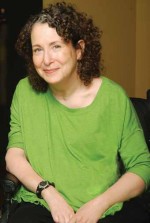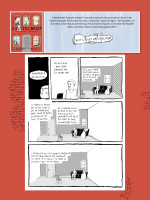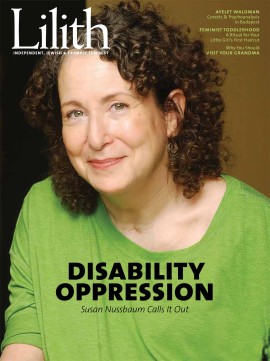Spring 2014
In this issue: Susan Nussbaum actively targets “disability oppression.” Liana Finck graphically envisions the family sagas behind the Yiddish advice column “A Bintel Brief.” New feminist ritual: a little girl’s first haircut and its Jewish roots. Visiting the old old. Measuring life’s changes when you learn the same page of Talmud seven years later. Ayelet Waldman’s new novel folds in Freud-era psychoanalysis, Hungarian suffragists and post-Holocaust Zionist tactics.

A Little Girl’s First Haircut
by Alanna E. Cooper
The author recasts upsherin, the traditional boy’s coming-of-toddlerhood ceremony, for her three girls.
- Haircutting Ritual for Your Daughter by Alanna E. Cooper
 Subscriber Exclusive
Subscriber Exclusive The Refusal of Time: Visiting the Old Old
A social worker on her unlikely half-day friendship with a demented charge; a Florida yakker on her ball-busting butcher-mom in the Old Country; fail-safe & haimish prompts for your next hajj to the nursing-home, and what Grandma did with those Nazi bedsheets.
- Wordless Tea by Liat Katz
- “Go check on Gramma,” my father said. by Gayle Ann Weinstein
- The Gingham Dresses by Alisha Kaplan
- Reading “Dear Abby” in Massachusetts by Jayne Lampert
- Capturing the Elderly Visiting Each Other

Disability Oppression
by Susan Nussbaum
Author Susan Nussbaum, paraplegic and a fierce activist for girls in chairs, tells Susan Weidman Schneider why “access” is just another term for disability oppression.
Same Page, Seven Years Later
by Ilana Kurshan
Juggling three children under age three and her publishing job, she breaks her arm. Kurshan reflects: “In order to heal, bones have to set, and so I find myself wondering what has set in my life in the time between my two encounters with the Talmud tractate Yoma.”
The Young Suffragist’s Diagnosis
fiction by Ayelet Waldman
Plus, Waldman talks about the drama folded into her new novel: corset-shedding early European feminists, tender Freud-era psychoanalysis, looted art, the complex schemes of post-Holocaust Zionism, and the family life of Syrian Jews.
- Ayelet Waldman on chance, and obsession by Ayelet Waldman
Jewish Filmmaking—Curse or Calling?
by Amy Stone
Hungarian filmmaker Diana Groó sees herself as part of a “traumatized third generation” of Jews who refused to speak about their past. She’s breaking that mold with her bold new films.
 Subscriber Exclusive
Subscriber Exclusive Born Out of Wedlock
art by Liana Finck
At the turn of the [last] century, Jewish immigrants wrote for advice to the Yiddish Forward. In A Bintel Brief: Love and Longing in Old New York, Finck graphically envisions the mini-dramas these letters limn.
 Subscriber Exclusive
Subscriber Exclusive In the Desert
a short story by Sarah Seltzer
Written on Matzoh
a poem by Sarah Antine
Naomi Danis praises Lore Segal
Judy Batalion dissects novels about Jewish Brits
Eleanor J. Bader reads the confessions of a midwife
How Jewish texts can help women — rabbis included — through trying transitions
Powerful Intimacies in Both Old Country and New
Rabbi Chana Thompson Shor compares two edgy books on social justice
 Please wait...
Please wait...
